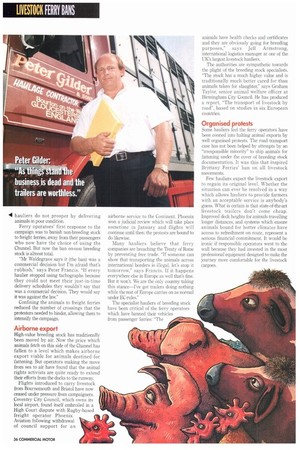• hauliers do not prosper by delivering animals in poor condition.
Page 38

If you've noticed an error in this article please click here to report it so we can fix it.
Ferry operators' first response to the campaign was to banish non-breeding stock to freight ferries, away from their passengers who now have the choice of using the Chunnel. But now the ban on-non breeding stock is almost total.
"Mr Waldegrave says it (the ban) was a commercial decision but I'm afraid that's rubbish," says Peter Francis. "If every haulier stopped using tachographs because they could not meet their just-in-time delivery schedules they wouldn't say that was a commercial decision. They would say it was against the law."
Confining the animals to freight ferries reduced the number of crossings that the protesters needed to hinder allowing them to intensify the campaign.
Airborne export
High-value breeding stock has traditionally been moved by air. Now the price which animals fetch on this side of the Channel has fallen to a level which makes airborne export viable for animals destined for fattening. But operators making the move from sea to air have found that the animal rights activists are quite ready to extend their efforts from the docks to the runway.
Flights introduced to carry livestock from Bournemouth and Bristol have now ceased under pressure from campaigners. Coventry City Council, which owns its local airport, found itself embroiled in a High Court dispute with Rugby-based freight operator Phoenix Aviation following withdrawal of council support for an airborne service to the Continent. Phoenix won a judicial review which will take place sometime in January and flights will continue until then: the protests are bound to do likewise.
Many hauliers believe that ferry companies are breaching the Treaty of Rome by preventing free trade. "If someone can show that transporting the animals across international borders is illegal, let's stop it tomorrow," says Francis. If it happens everywhere else in Europe as well that's fine. But it won't. We are the only counn-y taking this stance—I've got trailers doing nothing while the rest of Europe carries on as normal under EC rules."
The specialist hauliers of breeding stock have been critical of the ferry operators which have banned their vehicles from passenger ferries: "The animals have health checks and certificates and they are obviously going for breeding purposes," says Jeff Armstrong, international logistics manager at one of the UK's largest livestock hauliers.
The authorities are sympathetic towards the plight of the breeding stock specialists. "The stock has a much higher value and is traditionally much better cared for than animals taken for slaughter," says Graham Taylor, senior animal welfare officer at Birmingham City Council. He has produced a report, "The transport of livestock by road", based on studies in six European countries.
Organised protests
Some hauliers feel the ferry operators have been conned into halting animal exports by well organised protests. The road transport case has not been helped by attempts by an "irresponsible minority" to ship animals for fattening under the cover of breeding stock documentation. It was this that inspired Brittany Ferries' ban on all livestock movements.
Few hauliers expect the livestock export to regain its original level. Whether the situation can ever be resolved in a way which allows hauliers to provide farmers with an acceptable service is anybody's guess. What is certain is that state-of-the-art livestock trailers don't come cheap. Improved deck heights for animals travelling longer distances, and systems which ensure animals bound for hotter climates have access to refreshment on route, represent a serious financial commitment. It would be ironic if responsible operators went to the wall because they had invested in the most professional equipment designed to make the journey more comfortable for the livestock cargoes.
























































































